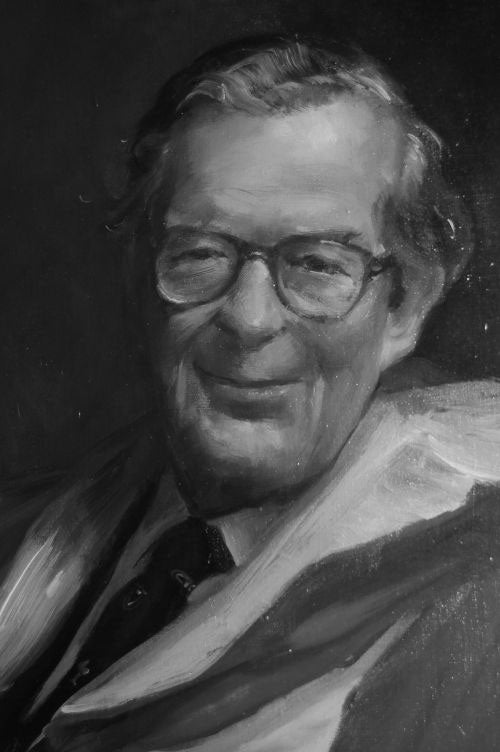Professor Sir Hugh Ford: Doyen of mechanical engineering who contributed to many major technological advances

The mechanical engineer Sir Hugh Ford lived for nearly a century, a lifetime that spanned a period of unprecedented technological advance, from the coming of the age of oil and its new polymer materials, to rocket flight, the jet engine, the Moon landing, radio, television, computing, lasers, and micro digital electronics. He directly contributed to many of these developments and, as head of the department of Mechanical Engineering at Imperial College, he fostered enthusiasm and practical skills in generations of students, many of whom have become leaders in industry and society.
Ford anticipated our concerns about energy and sustainability some 20 years before they became fashionable, and introduced innovations in engineering courses – such as management and design studies in his total technology course – well before such additions became mandated. He pioneered aspects of engineering research which have become mainstream, and his early work in industry helped to establish world-recognised techniques. He was truly the doyen of mechanical engineering.
Hugh Ford came from a humble background and left Northampton school at 16 to become an apprentice in fitting, turning and erecting with the Great Western Railway Company at its Swindon works. Railways were then integrated companies, and in the case of the Great Western, made everything themselves, down to the last nut and bolt, so provided a wide range of skills and training. Studying at evening classes, and on a day-release scheme inaugurated by the GWR, Ford enlisted in the London University external degree course.
He then won one of the scholarships that the engineer and entrepreneur Sir Joseph Whitworth had provided for in his will, to be awarded to time-served apprentices from poorer backgrounds; in 1934 Ford entered City & Guilds College in South Kensington. His quality rapidly showed; he gained a first-class degree and, as the top undergraduate of his year, was awarded the Bramwell Medal. He continued his studies with a PhD in problems of heat transfer and fluid flow.
During the Second World War, Ford joined ICI's alkali division in Cheshire as a research engineer. He worked on commercial high-pressure polyethylene plants, a world first, and the design of a pilot plant for the manufacture of chlorinated polyethylenes, helping to establish what has since become a major international industry.
Three years later he became chief technical officer at the British Iron and Steel Federation, then head of the mechanical working division of the British Iron and Steel Research Association (BISRA). His research into the operation and characteristics of cold strip mills gained him the Institution of Mechanical Engineers' Thomas Hawksley Gold Medal in 1948, and led to the development of automatic gauge control worldwide.
By 1947 he had gained experience in establishing new laboratories, at Sketty Hall and the Hoyle Street, Sheffield laboratories of BISRA. A brief period as technical director of Paterson Engineering, waterworks engineers, was followed in 1948 by a return to his alma mater as Reader in Applied Mechanics at Imperial College (previously City and Guilds College).
In 1951 he became Professor of Applied Mechanics and oversaw the rebuilding and re-equipment of the Mechanical Engineering department. During this period he taught and worked on applied mechanics research, plasticity theory and metalworking processes. His research crossed numerous fields including polymer engineering, biomechanics, high-pressure technology, fatigue and fracture mechanics. He headed the department of Mechanical Engineering from 1965 until his nominal retirement in 1978.
Although the department at Imperial College was his greatest love, he was busy in the world beyond too, where he had many consultancies and directorships. He was President of the Institution of Mechanical Engineers (1977-78) and of the Institute of Metals (1985-87), Founder Fellow of the Fellowship (later Royal Academy) of Engineering in 1976 and its Vice-President from 1981-83. Unusually for an engineer, he was elected a Fellow of the Royal Society in 1967 and was knighted in 1975.
Generations of students at Imperial hold him in the warmest affection. He always found time to take an interest in the concerns of his young charges and was a polished host. His customary dark suit, bowler hat and arrival at college in his Rolls-Royce marked him out as a man of substance; he had great charm, and remained dapper into his nineties. He loved his family and was a devoted father and grandfather. His interests were gardening, music, history and model engineering, where his early practical training came to the fore.
I recall being impressed by his wisdom when I first met him in the mid-1990s at meetings of the British Railways Board's research and technical committee on which we sat. In 2000, when I was appointed head of Mechanical Engineering at Imperial College, he generously entertained me for lunch at the Athenaeum. Perusing the wine list he said, "A special occasion like this calls for a special bottle of claret", before telling me exactly how to run the department, of which, in his heart, though long retired, he was still leader.
At a recent dinner to mark the 75 years of his association with Imperial, he delivered a witty, confident, elegant and technically informed speech to the delight of the guests. Only once did he ever suggest that the end might be near: a year ago, after signing my nomination papers for the Presidency of the Institution of Mechanical Engineers, he wished me well, but doubted he would live long enough to see my installation. Sadly, he was correct.
Hugh Ford, mechanical engineer: born Northampton 16 July 1913; Reader in Applied Mechanics, London University (Imperial College of Science and Technology) 1948–51, Professor 1951–69, head of department of Mechanical Engineering 1965–78; Kt 1975; married 1942 Wynyard, (two daughters, died 1991), 1993 Thelma Jensen; died London 28 May 2010.
Join our commenting forum
Join thought-provoking conversations, follow other Independent readers and see their replies
Comments
Bookmark popover
Removed from bookmarks